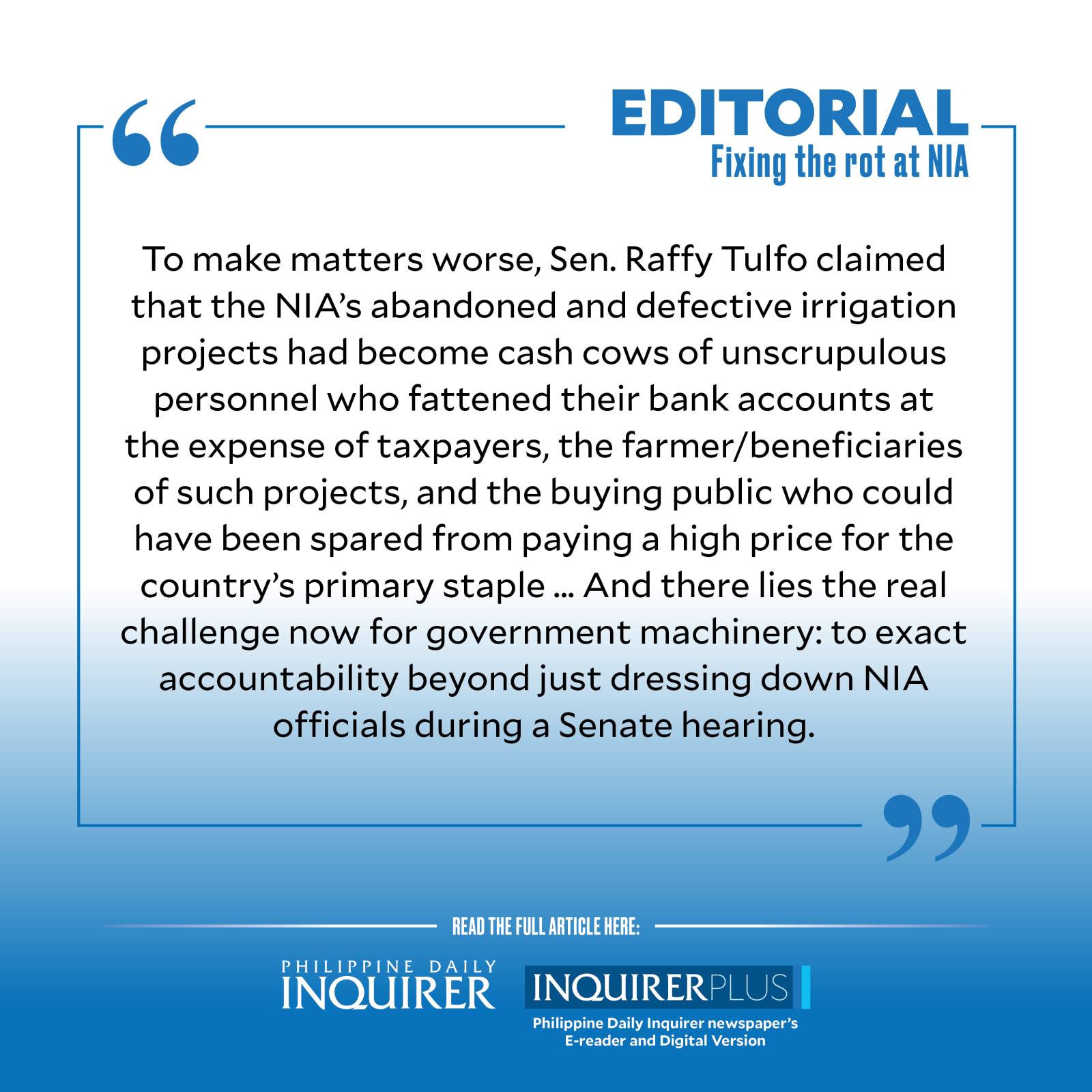Fixing the rot at NIA

Sen. Raffy Tulfo has been unrelenting in his attacks against the National Irrigation Administration (NIA), which he lambasted for unfinished irrigation projects that would have helped increase the yield of the country’s farmlands, thus raising the farmers’ meager income and shoring up food security.
Tulfo certainly has valid reasons to rage against the 60-year-old government-owned and -controlled corporation, whose mandate is to develop and manage the country’s irrigation systems. He revealed that last month, despite some P121 billion allocated to NIA by Congress over the last six years, it has yet to complete crucial projects, some of which have been delayed by more than five years.
During the Senate blue ribbon committee hearing, Tulfo said former and current NIA officials had tolerated defective, incomplete, and ghost irrigation projects, when the proper infrastructure support would have helped increase the country’s harvest.
Tulfo noted that the NIA Inspection and Assessment Team itself has admitted that as many as 28 “anomalous” irrigation projects were never even started, with as much as P890 million in government funds earmarked for them. “Our farmers cannot produce enough because the funds for their irrigation [needs are] being plundered at their, and the people’s, expense,” Tulfo said.
The senator also exposed a litany of shortcomings at NIA, from shoddy workmanship and the use of substandard materials in constructing irrigation structures to the awarding of contracts to favored contractors, and the submission of erroneous reports of completion that were used to justify full payment to contractors.
Indeed, the consequences of such criminal neglect and corruption are being keenly felt now, with Filipinos buckling under the weight of high prices, especially of rice, no thanks to the lack of an efficient irrigation system that would have produced a decent yield that can be marketed at affordable prices.
In fact, NIA has only managed to irrigate 65.28 percent of the 3.128 million hectares of irrigable areas across the country, while only 38 of the 80 target provinces and chartered cities have received the agricultural machinery, equipment, facilities, and small-scale irrigation projects due them. Rued Tulfo: “If only these [projects] were implemented properly and [the infrastructure] constructed, we would perhaps not need to import rice by now; instead, we may already be exporting rice.”
To make matters worse, Tulfo claimed that the NIA’s abandoned and defective irrigation projects had become cash cows of unscrupulous personnel who fattened their bank accounts at the expense of taxpayers, the farmer/beneficiaries of such projects, and the buying public who could have been spared from paying a high price for the country’s primary staple.
“In a lot of cases, unscrupulous individuals are raking in profits from these irrigation projects, [by] seeking funding for [their supposed] maintenance. In truth, no maintenance is done and the funding only goes straight to their pockets,” said Tulfo. “We want to hold responsible people accountable,” he added.
And there lies the real challenge now for government machinery: to exact accountability beyond just dressing down NIA officials during a Senate hearing.
As Senate blue ribbon committee chair Sen. Francis Tolentino rightly emphasized, testimonies from private contractors and other personalities who may have knowledge of the alleged defects in existing irrigation projects, as well as those that have been delayed, need to be taken so that clear and hard evidence can be gathered to build ironclad cases.
The NIA leadership led by acting chief Eduardo Guillen must be taken to task, and mandated to clean up the agency’s ranks with its own investigation. As Guillen himself admitted during the hearings, corruption within the agency exists, with the new leadership under the Marcos administration “trying to fix the system.” The embattled agency is just now coming out of “silent chaos” and “confusion” that hounded it last year when its former head Benny Antiporda was suspended by the Ombudsman in November following employees’ complaints of grave misconduct, harassment, and oppression.
President Marcos replaced Antiporda with former Piddig, Ilocos Norte mayor Eduardo Guillen, who must take his appointment as acting NIA chief as an opportunity to start hacking at the root of corruption that has seemingly permeated the agency. Such decisive house-cleaning is crucial if government were to achieve its stated goal of food security.




















